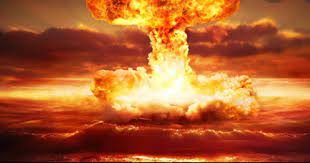Nuclear powers have criticized an effort led by the Marshall Islands at the United Nations to seek help on dealing with the consequences of nuclear testing, sources following the talks involving countries including the United States, Britain, Russia, India and China told Reuters.
Pacific islanders, who are particularly threatened by rising sea levels from climate change, are becoming more vocal in seeking redress from former colonial powers and wealthy countries on environmental and climate issues which they say affect their human rights.
This motion brought to the Human Rights Council on Monday by the Marshall Islands, Fiji, Nauru, Samoa and Vanuatu and backed by Australia requests assistance from the UN rights office; seeks a report from its boss; and calls for a future debate at the council.
“The nuclear legacy is a lived reality for us that must be addressed,” Samuel Lanwi, deputy permanent representative of the Republic of the Marshall Islands (RMI) in Geneva told Reuters.
The United States conducted 67 nuclear weapons tests in the Marshall Islands from 1946 to 1958 including “Castle Bravo” at Bikini Atoll in 1954 – the largest U.S bomb ever detonated. Islanders still suffer the health and environmental effects such as high cancer rates and enduring displacement from contaminated areas.
The Marshall Islands Ambassador to the UN in Geneva, Doreen de Brum could not join the talks because she is on leave following her daughter’s death from cancer. “My fight for nuclear justice is personal,” she said on Twitter.
While the motion does not mention the United States by name, some see it as an attempt to wield leverage over Washington in ongoing negotiations on a Compact of Free Association (COFA) that governs U.S economic assistance to the RMI. Marshallese diplomats deny this.
The nuclear legacy has been a major sticking point in the talks, although last week U.S President Joe Biden’s administration acknowledged it and said it remained committed to addressing concerns.
The U.S mission in Geneva declined to comment.
The Marshall Islands, one of 47 voting members on the rights council, is a key Western ally including on human rights, such as on scrutiny of China’s rights record.
Three sources who attended the Geneva talks told Reuters they were surprised by the level of resistance to a resolution seeking “technical assistance” – a term that could take the form of legal and political advice – rather than a formal probe.
“Nuclear powers were converging in their determination to protect themselves from any future accountability and there were attempts to empty out the resolution of any significance,” Yves Lador from Earthjustice said.
Diplomats say there were concerns about opening the door for future litigation. Past nuclear test sites include French Polynesia, Algeria, Kazakhstan and China’s Xinjiang.
The United States, Britain and India all argued that the rights council was not the appropriate forum to raise the issue and sought to strip out references to the new UN right to a clean and healthy environment, according to the sources.
China and Russia also argued for the latter, they said.
The British and Russian missions declined to comment. India’s did not respond. A spokesperson for China’s mission said they had “constructively participated” in the talks.
A vote might be called later this week – something that happens in a minority of cases when countries cannot agree.
Jennifer Philpot Nissen from the World Council of Churches said that her Marshallese constituents were hoping for a win. “Knowing they are not forgotten is huge,” she said.
SOURCE: REUTERS/PACNEWS













